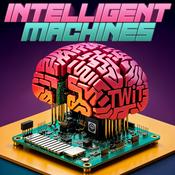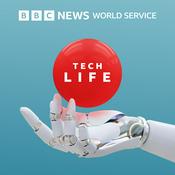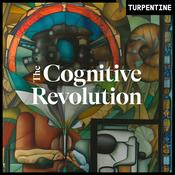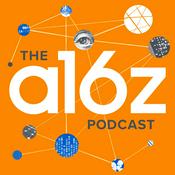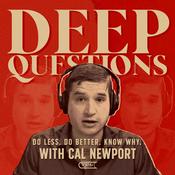164 avsnitt
- The AI labs fighting for attention during the Super Bowl call to mind another iconic Super Bowl moment: Apple’s 1984 ad for the Macintosh, which promised that the personal computer would be a source of unbound wonder, freedom, and delight.
They were right, but over time, the personal computer has also become cluttered with errands.
These “computer errands”—downloading a W-2 when tax season rolls around, hunting for the right coupon code before checkout, or navigating the unholy labyrinth of the Amazon Web Services dashboard just to change one permission setting—have taken over our digital lives. Atlas, OpenAI’s agentic browser, sprang from the idea that AI should handle this tedium for you.
In this week’s episode of AI & I, Dan Shipper sat down with two members of the Atlas team, Ben Goodger and Darin Fisher. Goodger is Atlas’s head of engineering, and Fisher is a member of the technical staff. Both are legends of the browser world. They’ve spent decades building the modern web, working together on Netscape, Firefox, and Chrome before arriving at Atlas. From that vantage point, they told Dan how they think browsing is about to change, why building a browser is harder than it looks, and what it’s like to create a new one with AI coding tools like Codex.
If you found this episode interesting, please like, subscribe, comment, and share!
Want even more?
Sign up for Every to unlock our ultimate guide to prompting ChatGPT here: https://every.ck.page/ultimate-guide-to-prompting-chatgpt. It’s usually only for paying subscribers, but you can get it here for free.
To hear more from Dan Shipper:
Subscribe to Every: https://every.to/subscribe
Follow him on X: https://twitter.com/danshipper
Move fast, don’t break things
Most AI coding tools don’t know which line of code will actually break your system. Try Augment Code, which understands your entire codebase, including the repos, languages, and dependencies that actually runs your business, and use their playbook to learn more about their framework, checklists, and assessments. Ship 30% faster with 40% shorter merge times.
[Playbook at augmentcode.com]
Timestamps:
00:01:57 - Introduction
00:11:51 - Designing an AI browser that’s intuitive to use
00:15:24 - How the web changes if agents do most of the browsing
00:25:06 - Why traditional websites will not become obsolete
00:29:00 - A browser that stays out of the way versus one that shows you around
00:39:51 - How the team uses Codex to build Atlas
00:44:47 - The craft of coding with AI tools
00:52:33 - Why Goodger and Fisher care so much about browsers
Links to resources mentioned in the episode:
Ben Goodger: Ben Goodger (@bengoodger)
Darin Fisher: Darin Fisher (@darinwf)
OpenAI’s browser, Atlas: Introducing ChatGPT Atlas - A few weeks ago, Natalia Quintero wouldn’t have called herself technical. But since the beginning of January, she has woken up at 6 a.m. to vibe code with Claude. The AI project manager she built saved her 14 hours a week.
Getting there meant scrapping the system three times and starting over. But the result handles everything from onboarding new clients to generating weekly updates across all projects.
Natalia is the head of AI consulting at Every. As part of the role, she's spoken with over 100 organizations in the past year and worked with a select two dozen, including hedge funds, private equity firms, and Fortune 500 companies. She’s seen what separates companies thriving with AI from those floundering, and it comes down to patterns that have nothing to do with having the most resources or the fanciest tools.
Dan Shipper had her on AI & I to share what she’s learned from this front-row seat to AI adoption. Quintero reveals how a private equity firm cut investment memo creation from three weeks to 30 minutes, why AI adoption needs to come from the top down, and what happened when she learned from her early morning experiments.
She also explains why the companies going furthest with AI are the ones that give employees permission to fail—and how that counterintuitive approach is revolutionary.
If you found this episode interesting, please like, subscribe, comment, and share!
Want even more?
Sign up for Every to unlock our ultimate guide to prompting ChatGPT here: https://every.ck.page/ultimate-guide-to-prompting-chatgpt. It’s usually only for paying subscribers, but you can get it here for free.
To hear more from Dan Shipper:
Subscribe to Every: https://every.to/subscribe
Follow him on X: https://twitter.com/danshipper
Ready to build a site that looks hand-coded—without hiring a developer? Launch your site for free at www.Framer.com, and use code DAN to get your first month of Pro on the house.
Timestamps:
00:00:00 - Introduction
00:01:30 - Why successful AI adoption requires coordinated, top-down effort
00:07:05 - How a private equity firm reduced investment memo creation from weeks to 30 minutes
00:13:30 - The benefits of connecting AI to proprietary context
00:15:20 - The plan-delegate-assess-compound framework for engineering teams
00:17:55 - How non-technical team members are becoming vibe coding addicts
00:20:50 - Building Claudie: an AI project manager from scratch
00:23:00 - Why creative exploration time outside the 9-to-5 is essential
00:27:50 - Live demo: How Claudie automates client onboarding and tracking
00:38:40 - The human side of AI: spending less time in spreadsheets, more time with people
Links to resources mentioned in the episode:
Natalia Quintero: Natalia Quintero (@NataliaZarina)
What Natalia learned from working with companies on AI adoption: https://every.to/on-every/the-next-chapter-of-every-consulting
Every’s compound engineering plugin: https://github.com/EveryInc/compound-engineering-plugin - Entrepreneur Andrew Wilkinson used to sleep nine hours a night. Now he wakes up at 4 a.m. and goes straight to work—because he can’t wait to keep building with Anthropic’s latest model, Opus 4.5.
Two years ago, Wilkinson was obsessed with vibe coding on AI software development platform Replit. It was thrilling to describe something in plain English and watch an app appear, less thrilling when the apps were always broken in some way, often full of maddening bugs. So he set his app creation ambitions aside until technology caught up with them.
Then, a few weeks ago, he started playing with Claude Code and Opus 4.5. It felt, he says, like having a “$100,000-a-month payroll of engineers” working for him around the clock.
Wilkinson is the cofounder of Tiny, a company that buys profitable businesses and holds them for the long term. The Tiny portfolio includes the AeroPress coffee maker and Dribbble, a platform where designers can share their work and find jobs. Dan Shipper had him on AI & I to talk about the automations Wilkinson has built for his work and personal life, including an AI relationship counselor, a custom email client, and a system that texts him outfit recommendations each morning. Wilkinson revealed how all of this individual exploration has changed the way he thinks about buying software companies at Tiny.
If you found this episode interesting, please like, subscribe, comment, and share!
Want even more?
Sign up for Every to unlock our ultimate guide to prompting ChatGPT here: https://every.ck.page/ultimate-guide-to-prompting-chatgpt. It’s usually only for paying subscribers, but you can get it here for free.
To hear more from Dan Shipper:
Subscribe to Every: https://every.to/subscribe
Follow him on X: https://twitter.com/danshipper
Ready to build a site that looks hand-coded—without hiring a developer? Launch your site for free at www.framer.com, and use code DAN to get your first month of Pro on the house!
Timestamps:
00:00:00 - Start
00:01:07 - Introduction
00:02:48 - Why Opus 4.5 feels like the iPhone moment for vibe coding
00:08:31 - Why designers have a unique advantage with AI
00:14:10 - How Wilkinson built a custom email client with Claude Code
00:18:13 - An AI trained on your relationship that predicts your fights
00:30:40 - Using AI meeting notes to make your life better
00:35:11 - Don't inject your opinion into prompts
00:40:21 - Wilkinson’s Claude Code tips and workflows
00:47:59 - Your personal stylist is a prompt away
00:53:17 - How AI is changing the way Wilkinson invests in software
Links to resources mentioned in the episode:
Andrew Wilkinson: Andrew Wilkinson (@awilkinson)
The book Wilkinson references in his prompts, when writing copy with AI: Made to Stick
Every’s compound engineering plugin: https://github.com/EveryInc/compound-engineering-plugin - LLMs have made it absurdly easy to go deep on almost any topic. So why haven’t we all used ChatGPT to earn college degrees we wished we had majored in or pursued a niche interest, like learning how to name the trees in our neighborhood? I know I’m not the only one to feel guilty for well-intentioned attempts at autodidactism that inevitably peter out.
Entrepreneur Nir Zicherman has a reason for this disconnect: LLMs can answer most of your questions, but they won’t notice when you’re lost or pull you back in when your motivation starts to fade.
As the CEO and cofounder of Oboe, a platform that generates personalized courses about everything from the history of snowboarding to JavaScript fundamentals using AI, Zicherman has thought deeply about why the ability to access information does not automatically lead to understanding a concept. In this episode of AI & I, he talks to Dan Shipper about everything he’s learned about learning with LLMs.
They get into Zicherman’s counterintuitive belief that learning is a more passive process than you’d think, the biggest blocker for most people who want to learn something new, and where AI agents currently fall short in providing a meaningful learning experience.
If you found this episode interesting, please like, subscribe, comment, and share!
Want even more?
Sign up for Every to unlock our ultimate guide to prompting ChatGPT here: https://every.ck.page/ultimate-guide-to-prompting-chatgpt. It’s usually only for paying subscribers, but you can get it here for free.
To hear more from Dan Shipper:
Subscribe to Every: https://every.to/subscribe
Follow him on X: https://twitter.com/danshipper
Timestamps:
00:00:00 - Start
00:00:36 - Introduction
00:01:49 - Why you need a dedicated AI learning app
00:04:32 - The process of learning is more passive than you might think
00:10:21 - Live demo of Oboe to create a course about philosopher Ludwig Wittgenstein
00:16:52 - Learning works best when it comes in many formats
00:28:21 - Where AI agents currently fall short in the learning experience
00:34:10 - The importance of making learning feel accessible
00:35:56 - How Zicherman uses Oboe to learn quantum physics
00:40:54 - How embeddings spaces remind Dan of quantum mechanics
Links to resources mentioned in the episode:
Nir Zicherman: @NirZicherman
Learn something new with Oboe: https://oboe.com/ - Anthropic just dropped Claude Cowork—essentially Claude Code for everyone, not just engineers—and we got to chat about it with a product engineer at Anthropic who helped build it.
In this live Vibe Check, Dan Shipper and Kieran Klaassen explore the new interface together, testing what works (and what doesn't) in real time. Anthropic’s Felix Rieseberg joins midway through to explain the philosophy behind Cowork's design: why it separates "Tasks" from "Chats," how the queue system lets you send messages while the agent is working, and what "agent-native" architecture means in practice. They also dig into Skills—Claude's prompt system that lets you customize how it works—and the Chrome connector for browser automation.
This is a raw, unfiltered first look at what might be the future of how knowledge workers interact with AI: async workflows instead of turn-by-turn chat.
If you found this episode interesting, please like, subscribe, comment, and share!
Want even more?
Check out Dan's guide to building agent-native applications: https://every.to/guides/agent-native
To hear more from Dan Shipper:
Subscribe to Every: https://every.to/subscribe
Follow him on X: https://twitter.com/danshipper
00:01:00 - What is Claude Cowork
00:02:36 - First demo: competitor analysis
00:03:33 - Email drafting that sounds like me
00:06:18 - Calendar audit running for an hour
00:07:39 - Book taxonomy demo
00:08:42 - PostHog analytics via Chrome browsing
00:14:36 - Chat vs Code vs Cowork: when to use what
00:31:06 - Felix from Anthropic joins
00:36:39 - Why they built it in a week and a half
00:37:57 - Design decision: why a separate tab
00:43:57 - Skills as the primary hackable surface
00:49:36 - Agent-native architecture principles
00:56:57 - The origin story of skills at Anthropic
01:03:00 - Our final rating
Fler podcasts i Teknologi
Trendiga poddar i Teknologi
Om AI & I
Learn how the smartest people in the world are using AI to think, create, and relate. Each week I interview founders, filmmakers, writers, investors, and others about how they use AI tools like ChatGPT, Claude, and Midjourney in their work and in their lives. We screen-share through their historical chats and then experiment with AI live on the show. Join us to discover how AI is changing how we think about our world—and ourselves.
For more essays, interviews, and experiments at the forefront of AI: https://every.to/chain-of-thought?sort=newest.
Podcast-webbplatsLyssna på AI & I, The Interface och många andra poddar från världens alla hörn med radio.se-appen
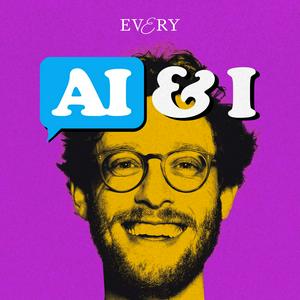
Hämta den kostnadsfria radio.se-appen
- Bokmärk stationer och podcasts
- Strömma via Wi-Fi eller Bluetooth
- Stödjer Carplay & Android Auto
- Många andra appfunktioner
Hämta den kostnadsfria radio.se-appen
- Bokmärk stationer och podcasts
- Strömma via Wi-Fi eller Bluetooth
- Stödjer Carplay & Android Auto
- Många andra appfunktioner


AI & I
Skanna koden,
ladda ner appen,
börja lyssna.
ladda ner appen,
börja lyssna.













